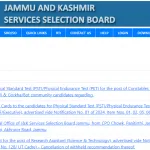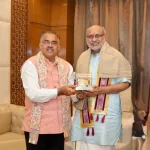The recent budget presented by Omar Abdullah in the assembly starkly exemplifies fiscal mismanagement, revealing a financial roadmap that panders to select constituencies while systematically neglecting the broader economic imperatives necessary for sustainable development. At first glance, the measures outlined masquerade as an inclusive economic strategy, but a rigorous examination exposes a myopic policy framework that undermines economic self-reliance in favor of populist appeasement. The state is at a juncture where sound economic policymaking should drive fiscal decisions, yet this budget regresses into an outdated welfare model that modern economies have long abandoned in pursuit of growth and resilience.
A deeper look at the budget allocations exposes a glaring misalignment between economic priorities and actual governance needs. The disproportionate emphasis on schemes for Antyodaya Anna Yojana (AAY) beneficiaries and other reserved groups reflects a fundamental misunderstanding of fiscal responsibility. Consider the promise of free electricity up to 200 units exclusively for AAY households and free transport for women—policies cloaked in social justice rhetoric but bereft of economic rationality. If AAY beneficiaries constitute less than ten percent of the population, why is the government indulging in targeted largesse while sidelining the productivity-driven needs of the remaining ninety percent? This selective redistribution lacks a coherent economic justification and exposes an administration driven more by electoral calculations than by empirical policymaking.
The reliance on what can only be described as “Rice Therapy”—a policy of perpetual dependency rather than economic enablement—exemplifies a regressive approach to governance. Rather than incentivizing labor force participation and human capital development, this budget cements an unsustainable reliance on state handouts.
Across the world, economies are transitioning toward investment-driven models that prioritize education, skill development, and entrepreneurship. Yet, Abdullah’s administration clings to a discredited welfare paradigm, as if economic progression were optional rather than imperative. This is not just a policy flaw; it is an ideological anachronism that disregards empirical evidence from economies that have successfully transitioned from stagnation to growth. Even socialist-leaning economies have pivoted toward mixed-market strategies, recognizing that indiscriminate welfare spending is anathema to long-term economic sustainability. The irony is as tragic as it is infuriating—while global economies pivot toward productivity and innovation, this budget anchors Jammu and Kashmir in an economic model that even its historical proponents have abandoned.
The budget speech, unsurprisingly, did little to reassure serious economic observers. Critics, including People’s Conference president Sajad Lone, astutely identified the blatant contradictions between the government’s rhetoric and its fiscal allocations. It is intellectually dishonest for an administration that once dismissed statistical data as manipulated to now champion the same figures as definitive proof of its economic vision. This selective appropriation of economic metrics is not just inconsistent—it is a blatant exercise in political expediency, raising fundamental concerns about the credibility and transparency of governance. Economic policymaking should be rooted in consistency and empirical rigor, not in opportunistic cherry-picking of statistics to suit transient political objectives.
Furthermore, the fiscal framework presented raises profound concerns about long-term viability. With an estimated expenditure of ₹1.12 lakh crore and a fiscal deficit approaching 3%, the budget exhibits a reckless disregard for sustainable economic planning. Resources are being disproportionately funneled into narrowly targeted welfare schemes at the expense of sectors that actually generate economic growth—namely, infrastructure, education, and industry. Economic development is not catalyzed through arbitrary subsidies but through investment in productivity-enhancing sectors. If genuine progress is the goal, why does this budget conspicuously lack any substantive provisions to stimulate private enterprise, create employment, or drive innovation? The obsession with welfare-driven expenditure, devoid of structural economic planning, is the equivalent of feeding a man for a day while systematically ensuring he remains incapable of providing for himself tomorrow.
A visual representation of this allocation imbalance underscores the stark economic irrationality at play. The following chart illustrates the distorted distribution, where an overwhelming share of resources is allocated to welfare schemes while key economic sectors remain critically underfunded.
The chart lays bare the fundamental flaw of this budget—it is an instrument of short-term political posturing rather than a blueprint for sustainable economic expansion. The systemic misallocation of financial resources not only alienates the majority of the population but also actively subverts the long-term economic trajectory of the state. By prioritizing transient populist measures over substantive structural reforms, the government is entrenching dependency rather than fostering an ecosystem conducive to investment, self-reliance, and growth.
This budget is not just economically unsound; it is emblematic of a deeply flawed governance philosophy that prioritizes vote-bank politics over macroeconomic stability. Public finance, when employed correctly, serves as a catalyst for inclusive growth, lifting entire populations rather than select interest groups. However, this financial plan treats governance as a zero-sum game, where extending benefits to one group necessitates the neglect of another. This is neither sound economic policy nor justifiable public administration—it is an egregious failure of fiscal prudence.
Perhaps the most damning indictment of this budget is its complete absence of a forward-looking vision.
There is no coherent strategy for industrialization, no significant investment in job creation, and no commitment to fostering competitive economic ecosystems. Instead, what we have is a dated script of fiscal irresponsibility—a policy framework that is not just obsolete but actively detrimental to long-term economic progress. History has demonstrated time and again that economies built on perpetual welfare dependence stagnate, whereas those that prioritize productivity, education, and entrepreneurship thrive. This administration, however, appears intent on repeating the mistakes of the past, willfully ignoring the empirical lessons of economic history.
If the objective of this budget was to reinforce the notion of a state dependent on handouts rather than economic empowerment, then it has achieved that goal with astonishing precision. But if the intention was to chart a path toward sustainable development and inclusive prosperity, then it has failed spectacularly. The irony is impossible to ignore—while the rest of the world advances toward innovation and self-sufficiency, we find ourselves shackled to an outdated economic doctrine that rewards passivity over productivity.
Ultimately, this budget is not a roadmap for economic revival; it is a calculated exercise in political patronage masquerading as fiscal policy. It is not just an economic misstep—it is a dereliction of duty, a reckless abdication of governance, and a tragic waste of potential. Abdullah’s administration has not presented a financial strategy; it has unveiled a manifesto for controlled economic stagnation. If history is any guide, the consequences of this misguided approach will be felt long after the immediate applause for welfare populism fades. And when the economic reckoning arrives, it will not be the select few beneficiaries of this budget who bear the cost—it will be the entirety of Jammu and Kashmir.
(The author can be reached at : [email protected] , X: @agasyedmuntazir)






